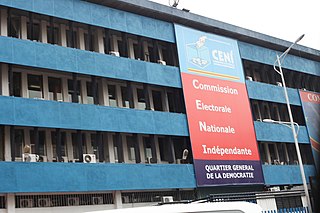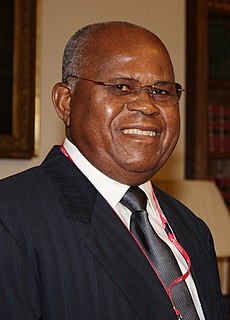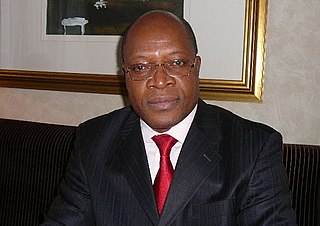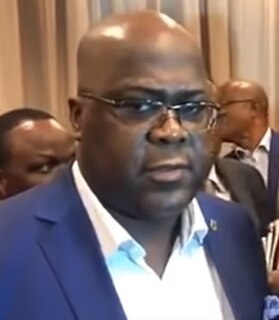| |||
| |||
 |
|---|
| This article is part of a series on the politics and government of the Democratic Republic of the Congo |
Government |
Judiciary |
| Foreign relations |
| United Nations Mission |
General elections are scheduled to be held in the Democratic Republic of the Congo on 23 December 2018, to determine a successor to incumbent President Joseph Kabila. [1] They were originally scheduled for 27 November 2016, but were delayed with a broken promise to hold them by the end of 2017. [2] According to the constitution, the second and final term of President Kabila expired on 20 December 2016. [3]

The Democratic Republic of the Congo, also known as DR Congo, the DRC, DROC, Congo-Kinshasa, or simply the Congo, is a country located in Central Africa. It is sometimes anachronistically referred to by its former name of Zaire, which was its official name between 1971 and 1997. It is, by area, the largest country in Sub-Saharan Africa, the second-largest in all of Africa, and the 11th-largest in the world. With a population of over 78 million, the Democratic Republic of the Congo is the most populated officially Francophone country, the fourth-most-populated country in Africa, and the 16th-most-populated country in the world.

The President of the Democratic Republic of the Congo, is the head of state of the Democratic Republic of the Congo and commander-in-chief of the armed forces.

Joseph Kabila Kabange is a Congolese politician who served as President of the Democratic Republic of the Congo between January 2001 and January 2019. He took office ten days after the assassination of his father, President Laurent-Désiré Kabila. He was elected as President in 2006 and re-elected in 2011 for a second term. Since stepping down after the 2018 election, Kabila, as a former president, will be a senator for life, according to the Constitution of the DRC.
Contents
Incumbent President Kabila is constitutionally unable to participate and a cabinet minister has said he will not run. [4] He and his party, the People’s Party for Reconstruction and Democracy, support the candidacy of Emmanuel Ramazani Shadary, the former Interior Minister. [5]
Emmanuel Ramazani Shadary is a politician in the Democratic Republic of the Congo, who was a presidential candidate in the December 2018 presidential elections in the country. He was selected following consultations within the ruling People's Party for Reconstruction and Democracy (PPRD) political party and the Common Front for Congo (FCC), political coalition. Shadary is the permanent secretary of the PPRD, and has previously served as the country's Interior Minister.
In opposition to Shadary's candidacy, seven opposition leaders, including Jean-Pierre Bemba and Moïse Katumbi, nominated Martin Fayulu as their candidate for president. [6]
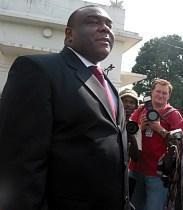
Jean-Pierre Bemba Gombo is a politician in the Democratic Republic of the Congo. He was one of four vice-presidents in the transitional government of the Democratic Republic of the Congo from 17 July 2003 to December 2006. Bemba also leads the Movement for the Liberation of the Congo (MLC), a rebel group turned political party. He received the second-highest number of votes in the 2006 presidential election. In January 2007 he was elected to the Senate.

Moïse Katumbi Chapwe is a Congolese politician and businessman. He was the Governor of the Katanga Province, located in the southern part of the Democratic Republic of the Congo, from 2007 to September 2015. He was a member of the People's Party for Reconstruction and Democracy (PPRD) until September 2015. He has been described by The Economist as "probably the second most powerful man in the Democratic Republic of Congo after the president, Joseph Kabila". Jeune Afrique named him "African of the Year" in 2015.

Martin Madidi Fayulu is a businessman and lawmaker from the Democratic Republic of the Congo. He is the leader of the Engagement for Citizenship and Development party. On 11 November 2018, he was chosen by seven opposition leaders to be their joint presidential candidate in the 2018 Democratic Republic of the Congo general election. However, within 24 hours, Félix Antoine Tshisekedi Tshilombo, the eventual winner of the 2018 presidential election and Vital Kamerhe, the other oppositional candiate, rescinded their endorsement of his candidacy and formed their own pact with Tshisekedi as candidate.
